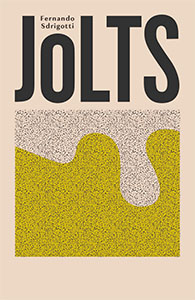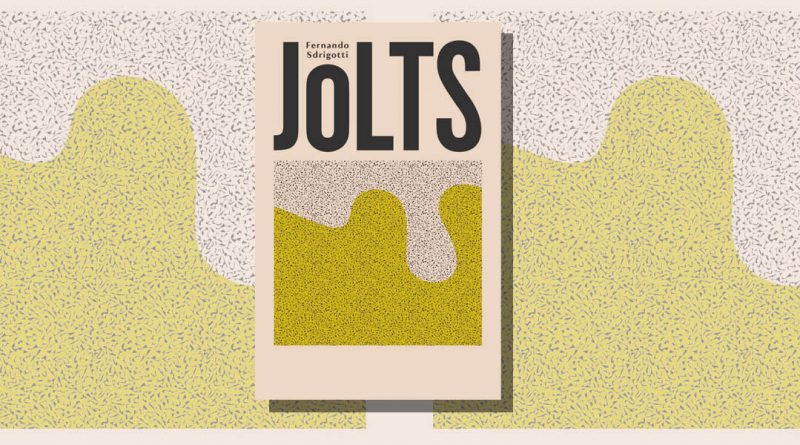Jolts by Fernando Sdriggoti
–Reviewed by Trahearne Falvey–
A few pages into ‘A Barbecue and an Exhumation in Victoria Park Village’, the centrepiece of Fernando Sdrigotti’s Jolts (Influx Press), we get the following exchange between ‘The Landlady’ and the narrator, ‘The Tenant’:
‘I think he started the banking crisis’
‘Which crisis?’ I ask.
‘This crisis we’re in now. We’ve been in a financial crisis for like nine years!’
‘Are we still in that crisis? I thought we were in a new crisis now,’ I say.
‘It’s all part of the same crisis from nine years ago…It all boils down to that, that’s what they say.’

Jolts is an attempt to give narrative shape to the always changing, always-in-crisis now. Sdrigotti, the editor of the journal Minor Literature(s) and lecturer in Latin America literature at Birkbeck, fled to Dublin from Argentina at the start of the century from a devastating economic depression (‘everyone had left,’ he writes in ‘Ceci N’est Pas un Memoire’, ‘or was thinking of leaving, figuring out how to get their money out of the bank, if the bank still existed’), then to Paris and finally to London, just in time for another crisis (the global crash of 2007), and then another (Brexit).
Jolts, published by Influx Press, entered the world the other month in the midst of an unprecedented crisis, when our concepts of time and space were radically altered. People are dying and losing jobs, and economists are predicting something worse than even the depression of the 1930s, while, of course, climate catastrophe looms. How on earth, the book asks, can a person live and narrativize a linear life in the middle of all this? How is literature possible?
Sdrigotti makes a strong case for the short story, and especially the fragment, as a suitable form for representing the experience of living through crises. In the titular piece, which moves between a packed, unmoving train in Clapham Junction, Paris, Buenos Aires and Rosario, the narrator (who can be interpreted as an autofictional ‘I’) receives an email from the editors of a literary magazine who “do not appreciate the jolts in time” in his submission and ask him to edit it. “The problem is,” Sdrigotti writes, “the piece is called ‘Jolts’ and is precisely about jolts in time and space, about how some of us are more fragmented than the rest, particularly on some days”.
The editors’ comments make the narrator sick, and the bodily experience of nausea acts as a thread to join memories in the story, like fishing with his grandfather as a child and the beginnings of a divorce. The story is evidence both of the difficulty of narrativizing the contemporary and of Sdrigotti’s refusal to conform to the editors’ call for linearity and conclusiveness.
Like much of Jolts, it’s a poetic, insightful and funny exploration of time: the ways that experiences shape and colour the memories of earlier experiences.
This point about “some of us” being “more fragmented than the rest” is important. Feelings of dislocation can be universal, of course, but as Sdrigotti highlights, a migrant is more likely than non-migrants to feel alienated from others around them. ‘A Barbecue and an Exhumation’ is a rare example of ‘Brexit lit’ written by someone ‘among the English’, as its narrator puts it, not of them. Significantly, it examines not the blatant xenophobia of nationalist Brexiteers but the forms of othering, fetishising and patronising performed on the migrant by those who might, to use a tired term, be called the ‘Liberal Metropolitan Elite’.
When ‘The Tenant’, who has been in England for fourteen years, arrives at the barbecue with a potted plant as a gift, ‘the Landlady’ asks him: ‘Is it a tradition that you people bring plants when you’re invited to a party?’ It only gets worse from there. Sdrigotti reminds us that the bourgeoisie are as valid a target for satire as they ever have been; the other party guests – ‘The Boring Civil Servant’, ‘The Former Banker’, ‘The Unhappy Estate Agent’ – bombard him with questions over his occupation, his legitimacy to live in London and when he learnt English, while the Former Banker’s Writer’s Wife implores him: “If you take writing seriously you MUST find the time”. All the while, the narrator nods and smiles, loving how ‘beautiful, young and English they are’.
Sdrigotti must have been tempted to stretch the awfulness of these characters to farcical proportions but he doesn’t need to; a line like this is hilarious and plausible in equal measure:
“They might have to put their kids in a state school. It’s critical. But we are deffo going to Glasto, next year”.
Again, Sdrigotti plays around with time; it becomes ‘flexible’ from too much weed and beer, and though the narrator falls asleep while the titular ‘Exhumation’ takes place he still narrates it (or at least, a version of it). The exhumation is a brilliantly weird twist, in which Sdrigotti displays his skill at leaving important things unopened and unspoken, used throughout the collection.
With the narrator asleep, the party guests’ barely-there masks of liberal acceptance are allowed to slip, though only a little. They joke about the Landlady’s sexual interest in the Tenant, and ‘the Common Unemployed Boyfriend’ ‘pulls a face’ then says ‘‘Nothing!”. The other guests ‘laugh – they understand’: Sdrigotti suggests that the only difference between the two sides of the Brexit divide is prejudice left said or unsaid. Likewise, ‘Ceci N’est Pas Un Mémoire’, which chronicles the writer-narrator’s disorienting arrival in Dublin, hinges on an event left unspoken to the reader.
Sdrigotti examines how we ‘choose’ to remember or forget events, and how that alters experiences of time as well as troubling the distinctions between fiction and ‘life writing’. “[T]he I who writes, and the written I,” Sdrigotti writes, “will have mixed to the point of unrecognition”.
As this suggests, Jolts is at times a philosophical exploration of a life spent writing and travelling, and as such, it might put off readers who find the autofiction of writers like Ben Lerner or Sheila Heti navel-gazing. I found the stories surprising, often hilarious, and full of sharp observations on the weird permutations of late capitalism (including the only story I’ve read that spins something brilliant out of a trip to Sainsbury’s).
Sdrigotti takes the reader to Dublin’s Liffey river, to a square in Rome, to Buenos Aires, and, of course, the sunny back garden of a house in Victoria Park Village, so it was especially great to read at this time of enforced staticity.
Find out more about Jolts on the Influx Press website.

Reviewed by Trahearne Falvey — Trahearne is a teacher and writer from the South Coast of England. His fiction has appeared in Mycelia, Molotov Cocktail and Short Fiction, among other places, and his criticism has appeared in 3AM Magazine.
Twitter: @TrahearneF




